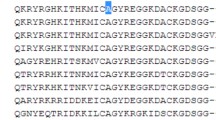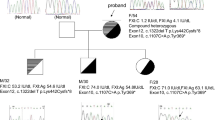Abstract
Factor XII deficiency is a rare inherited disorder caused by clotting factor XII (FXII, F12) deficiency. It is often asymptomatic but can have both thrombotic and haemorrhagic symptoms. The aim of this study was to describe the spectrum of F12 gene mutations in a Russian population and learn more about the relationship between F12 variants and clinical phenotypes. We obtained and analysed genetic and clinical data from 33 apparently unrelated patients with FXII plasma levels below 60% and genetic data from 26 healthy controls with no history of FXII deficiency. Forty mutant alleles and six different deleterious substitutions were identified. Of these substitutions, three were major in the Russian population (c.-62C > T, c.-57G > C and c.1532-1G > A, total frequency 92.5%) and the three others (p.615 del C, c.1180_1181delCA, and CD218 TAT- > CAT p.Tyr218His) were rare and novel in the world population. Eight patients with mild FXII deficiency were found to be homozygous for a hypomorphic variant of functional polymorphism C46T and have no other deleterious substitutions in the F12 gene. Contrary to data in the literature, our study showed that mild haemorrhagic manifestations are common among patients with FXII deficiency.

Similar content being viewed by others
Data availability
All data associated with this study are available in the main text, its supplementary materials and through the corresponding author upon request.
References
Simão F, Feener EP. The effects of the contact activation system on hemorrhage. Front Med. 2017;4:1–10.
Ratnoff OD, Busse RJ, Sheon RP. The demise of John Hageman. N Engl J Med. 1968;279:760–1. https://www.nejm.org/doi/pdf/10.1056/NEJM196810032791407
Goodnough LT, Saito H, Ratnoff OD. Thrombosis or myocardial infarction in congenital clotting factor abnormalities and chronic thrombocytopenias: a report of 21 patients and a review of 50 previously reported cases. Medicine (United States). 1983;62:248–55.
Girolami A, Randi ML, Gavasso S, Lombardi AM, Spiezia F. The occasional venous thromboses seen in patients with severe (Homozygous) FXII deficiency are probably due to associated risk factors: a study of prevalence in 21 patients and review of the literature. J Thromb Thrombolysis. 2004;17:139–43.
Renné T, et al. Defective thrombus formation in mice lacking coagulation factor XII. J Exp Med. 2005;202(2):271–81.
Geerts H. Of mice and men. CNS Drugs. 2009;23:915–26.
Gordon EM, Donaldson VH, Saito H, Su E, Ratnoff OD. Reduced titers of hageman factor (factor XII) in orientals. Ann Intern Med. 1981;95:697–700.
Kozlov AA et al. (2013) Manual for laboratory doctors. Working with coagulometers "Renam" reagents. M: Print
Richards S, et al. Standards and guidelines for the interpretation of sequence variants: a joint consensus recommendation of the American college of medical genetics and genomics and the association for molecular pathology. Genet Med. 2015;175(17):405–23.
Lombardi AM, et al. Genetic study in patients with factor XII deficiency: a report of three new mutations exon 13 (Q501STOP), exon 14 (P547L) and -13C>T promoter region in three compound heterozygotes. Blood Coagul Fibrinolysis. 2008;19:639–43.
Manfred S, et al. The novel acceptor splice site mutation 11396(G–>A) in the factor XII gene causes a truncated transcript in cross-reacting material negative patients. Hum Mol Genet. 1995;4:1235–7.
Sabater-Lleal M, et al. Combined cis-regulator elements as important mechanism affecting FXII plasma levels. Thromb Res. 2010;125:e55–e60.
Mordillo C, et al. "Molecular analysis of multiple genetic variants in Spanish FXII-deficient families. Haematologica. 2007;92(11):1569–72.
Acknowledgements
The study was funded by state assignment RK No. AAAA-A18-118032290163-2.
Author information
Authors and Affiliations
Corresponding author
Ethics declarations
Conflict of interest
The authors declare that they have no conflict of interest.
Additional information
Publisher's Note
Springer Nature remains neutral with regard to jurisdictional claims in published maps and institutional affiliations.
Supplementary Information
Below is the link to the electronic supplementary material.
About this article
Cite this article
Demidova, E., Salomashkina, V., Pshenichnikova, O. et al. Factor XII deficiency: a clinical and molecular genetic study. Int J Hematol 117, 678–683 (2023). https://doi.org/10.1007/s12185-023-03535-9
Received:
Revised:
Accepted:
Published:
Issue Date:
DOI: https://doi.org/10.1007/s12185-023-03535-9




